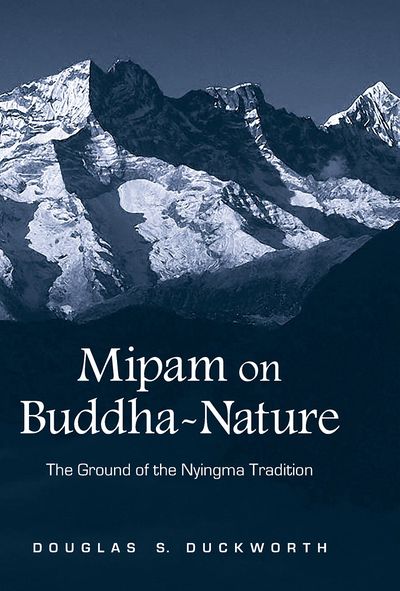m (Saved using "Save and continue" button in form) |
No edit summary |
||
| (3 intermediate revisions by 2 users not shown) | |||
| Line 1: | Line 1: | ||
{{Book | {{Book | ||
|BookPerson={{Book-person | |BookPerson={{Book-person | ||
|PersonPage=Mi pham rgya mtsho | |PersonPage=Mi pham rgya mtsho | ||
| Line 9: | Line 8: | ||
}} | }} | ||
|FullTextRead=No | |FullTextRead=No | ||
|TextTranslated=Bde gshegs snying po'i stong thun chen mo seng+ge'i nga ro | |TextTranslated=Texts/Bde gshegs snying po'i stong thun chen mo seng+ge'i nga ro | ||
|BookToc=* {{i|Preface|ix}} | |BookToc=* {{i|Preface|ix}} | ||
* {{i|Introduction|xi}} | * {{i|Introduction|xi}} | ||
| Line 58: | Line 57: | ||
*** {{i|Stating Other Traditions|149}} | *** {{i|Stating Other Traditions|149}} | ||
*** {{i|Presenting Our Authentic Tradition|153}} | *** {{i|Presenting Our Authentic Tradition|153}} | ||
**** {{i|The Meaning of the First Verse "Because the body of the perfect Buddha is radiant"|153}} | **** {{i|The Meaning of the First Verse "Because the body of the perfect<br>Buddha is radiant"|153}} | ||
**** {{i|The Meaning of the Second Verse "Because thusness is indivisible"|159}} | **** {{i|The Meaning of the Second Verse "Because thusness is indivisible"|159}} | ||
**** {{i|The Meaning of the Third Verse "Because of possessing heritage"|162}} | **** {{i|The Meaning of the Third Verse "Because of possessing heritage"|162}} | ||
| Line 64: | Line 63: | ||
*** {{i|Refuting the View that [the Basic Element] Is a Void Emptiness|168}} | *** {{i|Refuting the View that [the Basic Element] Is a Void Emptiness|168}} | ||
*** {{i|Refuting the Apprehension of [the Basic Element] as Impermanent and Conditioned|170}} | *** {{i|Refuting the Apprehension of [the Basic Element] as Impermanent and Conditioned|170}} | ||
** {{i|Appendix 2. ''Notes on the Essential Points of [Mipam’s] Exposition [of Buddha-Nature]''|181}} | ** {{i|Appendix 2. ''Notes on the Essential Points of [Mipam’s] Exposition<br>[of Buddha-Nature]''|181}} | ||
* {{i|Notes|191}} | * {{i|Notes|191}} | ||
* {{i|Bibliography|265}} | * {{i|Bibliography|265}} | ||
* {{i|Index|281}} | * {{i|Index|281}} | ||
|QuotesTabContent={{GetBookQuotes}} | |QuotesTabContent={{GetBookQuotes}} | ||
|PublisherLogo=File:SUNY Press logo.jpg | |PublisherLogo=File:SUNY Press logo.jpg | ||
|StopPersonRedirects=No | |||
|AddRelatedTab=No | |||
|BookParentPage=Secondary Sources | |||
|AddQuotesTab=Yes | |AddQuotesTab=Yes | ||
}} | }} | ||
Latest revision as of 11:17, 30 June 2023
A comprehensive overview of Tibetan Buddhist thinker Mipam’s work on emptiness and Buddha-nature.
Mipam ( 'ju mi pham rgya mtsho, 1846–1912) is one of the most prolific thinkers in the history of Tibet and is a key figure in the Nyingma tradition of Buddhism. His works continue to be widely studied in the Tibetan cultural region and beyond. This book provides an in-depth account of Mipam’s view, drawing on a wide range of his works and offering several new translations. Douglas S. Duckworth shows how a dialectic of presence and absence permeates Mipam’s writings on the Middle Way and Buddha-nature.
Arguably the most important doctrine in Buddhism, Buddha-nature is, for Mipam, equivalent to the true meaning of emptiness; it is the ground of all and the common ground shared by sentient beings and Buddhas. This ground is the foundation of the path and inseparable from the goal of Buddhahood. Duckworth probes deeply into Mipam’s writings on Buddha-nature to illuminate its central place in a dynamic Buddhist philosophy. (Source: SUNY Press)
| Citation | Duckworth, Douglas S. Mipam on Buddha-Nature: The Ground of the Nyingma Tradition. Albany: State University of New York Press, 2008. http://promienie.net/images/dharma/books/mipham_buddha-nature.pdf. |
|---|---|



